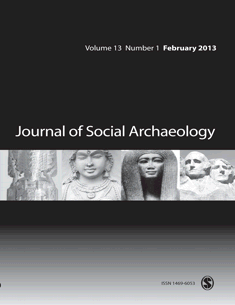
JOURNAL OF SOCIAL ARCHAEOLOGY
Scope & Guideline
Innovating Archaeological Research for a New Era
Introduction
Aims and Scopes
- Interdisciplinary Approaches:
The journal embraces interdisciplinary research, integrating methodologies from anthropology, sociology, geography, and history to enrich archaeological interpretations and understandings. - Decolonization and Indigenous Perspectives:
A significant focus on decolonizing archaeology, the journal highlights Indigenous methodologies and perspectives, advocating for the inclusion of marginalized voices in archaeological narratives. - Heritage and Identity:
Exploration of the role of heritage in shaping identities, particularly in postcolonial contexts, addressing how archaeological heritage influences contemporary cultural and national identities. - Community Engagement and Grassroots Initiatives:
Emphasis on community archaeology and grassroots heritage movements, examining how local communities engage with and reinterpret their cultural heritage. - Environmental and Political Contexts:
Research that situates archaeological findings within broader environmental and political contexts, exploring how heritage interacts with issues such as climate change, conflict, and colonial histories.
Trending and Emerging
- Decolonization of Archaeology:
There is a strong trend towards decolonizing archaeological practices, with a focus on integrating Indigenous knowledge systems and challenging colonial legacies within archaeological narratives. - Post-Conflict Heritage Management:
Emerging themes around post-conflict heritage management are gaining traction, particularly in regions recovering from war, highlighting the role of archaeology in healing and community rebuilding. - Cultural Heritage and Climate Change:
Increasing attention is being directed towards the impacts of climate change on cultural heritage, with researchers exploring how archaeological practices can address and mitigate these challenges. - Youth Engagement in Heritage:
A rising theme involves the active engagement of youth in heritage preservation efforts, emphasizing their role in safeguarding cultural heritage and fostering community involvement. - Interdisciplinary Environmental Archaeology:
There is a growing interest in the intersection of archaeology with environmental studies, focusing on how past human-environment interactions inform current ecological issues.
Declining or Waning
- Traditional Archaeological Methods:
There has been a noticeable decline in publications relying solely on traditional archaeological methods, such as excavation reports, as the journal increasingly favors interdisciplinary and social approaches. - Eurocentric Perspectives:
Research that predominantly reflects Eurocentric archaeological narratives is becoming less common, as there is a greater emphasis on non-Western perspectives and local narratives. - Material Culture Focus:
While material culture studies remain relevant, there seems to be a reduction in papers that solely focus on artifact analysis without contextualizing them within social frameworks or contemporary relevance. - Static Heritage Interpretations:
Papers that present static or unchanging views of heritage, without considering its dynamic nature and ongoing transformations, are less frequently published, reflecting a shift towards more fluid understandings of heritage. - Historical Archaeology in Isolation:
Themes centered on historical archaeology as a standalone discipline are waning, as the journal increasingly integrates historical contexts with contemporary issues and interdisciplinary approaches.
Similar Journals
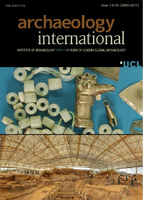
Archaeology International
Fostering collaboration in the ever-evolving field of archaeology.Archaeology International is a prestigious open-access journal dedicated to advancing the field of archaeology since its inception in 1997. Published by UCL PRESS, the journal provides a platform for researchers, professionals, and students to disseminate their findings and share innovative ideas in archaeological studies. It features a rich array of articles that capture current trends, methodologies, and debates within the discipline, fostering a collaborative academic environment. Based in London, England, this journal is committed to accessibility and inclusivity, ensuring that valuable research is available to a global audience without subscription barriers. With a focus on interdisciplinary approaches, Archaeology International serves as an essential resource for those interested in the preservation of cultural heritage, and it actively encourages contributions that explore both past civilizations and contemporary archaeological practices.
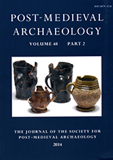
Post-Medieval Archaeology
Charting New Territories in Post-Medieval ResearchPost-Medieval Archaeology is a distinguished academic journal published by ROUTLEDGE JOURNALS, TAYLOR & FRANCIS LTD, focusing on the rich tapestry of human history from the post-medieval period through the lens of archaeology. With a proud publication history spanning since 1967, this journal addresses the integration of archaeological findings with historical narratives, contributing significantly to the field of archaeology and history. The journal holds an impressive categorization within the Q2 and Q3 quartiles for Archaeology and History in 2023, showcasing its commitment to academic excellence and relevance within these disciplines. Researchers and professionals alike will find value in its critical examinations and innovative methodologies that illuminate the past, making it a pivotal resource for those engaged in archaeological research. As an essential platform for scholarly debate and dissemination, Post-Medieval Archaeology continues to advance the understanding of post-medieval contexts and material culture, fostering discussions that resonate through various areas of the arts, humanities, and social sciences.
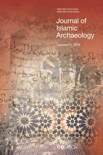
Journal of Islamic Archaeology
Advancing Knowledge in Islamic ArchaeologyJournal of Islamic Archaeology is a distinguished publication dedicated to advancing the field of archaeology through the lens of Islamic heritage and culture. Published by EQUINOX PUBLISHING LTD, this journal provides a platform for researchers, professionals, and students to disseminate their findings and engage in critical dialogue regarding the archaeological aspects of Islamic societies from 2014 to the present. With an ISSN of 2051-9710 and E-ISSN 2051-9729, the journal is indexed within significant academic databases and positioned notably in the Q3 and Q2 quartiles for archaeology in the Arts and Humanities and Social Sciences categories, respectively. The journal fosters scholarly exchange and innovation, drawing attention to the rich tapestry of Islamic archaeology, and securing its role as an essential resource for practitioners and academics alike. Its commitment to rigorous peer-review and high-quality contributions ensures a valuable repository of knowledge, enhancing the understanding of an often underrepresented field in archaeology.

Slovenska Archeologia
Pioneering research in the heart of Slovak archaeology.Slovenska Archeologia is a prominent journal published by the Slovak Academy of Sciences, Institute of Archaeology, dedicated to advancing the field of archaeology through rigorous scholarly research and insightful scholarship. With an ISSN of 1335-0102 and an E-ISSN of 2585-9145, this journal has been a vital platform for archaeologists and academics since its inception, converging its insightful publications from the years 2017 to 2023. Awarded a Q2 ranking in the field of archaeology across both arts and humanities categories, it holds a respectable position in the Scopus rankings, recognizing its contributions to the discipline. Based in Slovakia, the journal is an essential resource for professionals, researchers, and students interested in archaeological findings and methodologies. While it does not currently offer Open Access options, its commitment to promoting high-quality research makes it a valuable addition to the academic community.
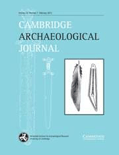
CAMBRIDGE ARCHAEOLOGICAL JOURNAL
Innovative Discoveries, Timeless ConnectionsThe Cambridge Archaeological Journal, published by Cambridge University Press, is a premier academic journal dedicated to archaeology and cultural studies. With an ISSN of 0959-7743 and an E-ISSN of 1474-0540, it has established itself as a leading platform since its inception in 1991, showcasing groundbreaking research that significantly contributes to our understanding of human history and cultural heritage. The journal currently ranks in the top quartile (Q1) across various categories, including Archaeology and Cultural Studies, underlining its impact and relevance in the field. The impact factor reflects its esteemed position, with Scopus ranks placing it within the 90th to 93rd percentiles among its peers. Researchers, professionals, and students alike benefit from its insightful analyses and interdisciplinary approaches, making it an essential resource for advancing knowledge in archaeology and related fields. The journal is based in the United Kingdom, at the Edinburgh Building, Shaftesbury Rd, CB2 8RU, Cambridge, England, and continues to drive scholarly conversations through its commitment to excellence and innovation in archaeological studies.

JOURNAL OF THE POLYNESIAN SOCIETY
Fostering Academic Dialogue on Polynesian HeritageJOURNAL OF THE POLYNESIAN SOCIETY, published by Polynesian Soc Inc, is a distinguished periodical that aims to disseminate high-quality research in the fields of anthropology, archaeology, and cultural studies. With an ISSN of 0032-4000 and E-ISSN 2230-5955, this journal serves as a key resource for scholars and practitioners interested in the rich historical and cultural narratives of the Polynesian region. Since its inception, the journal has published a multitude of scholarly articles, reflecting a convergence of research from 1971 to 2022, thus establishing itself as a foundational text within its domain. The journal is indexed in notable categories with a Q4 ranking in anthropology and a Q3 in both archaeology and cultural studies as of 2023, highlighting its relevant contributions to the academic community. Moreover, its impressive Scopus ranks position it within the 80th percentile for archaeology and the 67th percentile for anthropology, showcasing its dedication to scholarly excellence. Although not an open-access publication, the journal remains a vital avenue for academic discourse and exchange, making it a significant resource for researchers, professionals, and students dedicated to understanding the diverse cultures of the Pacific Islands.
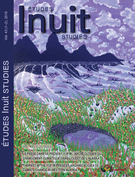
Etudes Inuit Studies
Bridging Past and Present in Inuit StudiesEtudes Inuit Studies is a prestigious academic journal published by Université Laval, Faculté des Sciences Sociales, dedicated to the in-depth exploration of Inuit cultures, languages, histories, and contemporary issues. With a significant presence in the fields of Arts and Humanities as well as Social Sciences, this journal boasts an impressive rank, placing it in the 81st percentile of general arts and humanities literature and in the top 54% of social sciences publications according to Scopus. The journal's commitment to disseminating high-quality, peer-reviewed research makes it an essential resource for researchers, professionals, and students interested in Inuit studies and related disciplines. Though it operates under a non-open access model, the rigorous scholarship presented within its pages reflects important contributions to understanding Indigenous perspectives. Covering research since its inception in 1985, and with a diverse range of topics examined until 2016, Etudes Inuit Studies remains a vital conduit for academic discourse and knowledge sharing in the realm of Inuit studies.
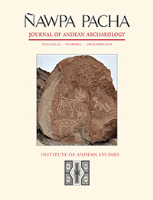
Nawpa Pacha
Fostering Interdisciplinary Dialogue in Archaeology.Nawpa Pacha, a prestigious journal published by Taylor & Francis Ltd, stands as a significant platform for advancing research in Archaeology within the fields of Arts and Humanities. Since its inception in 2019, it has rapidly established itself with an impressive impact, evidenced by its categorization in the Q1 quartile for Archaeology and its significant rankings—placing it at Rank #88 in the Arts and Humanities category and Rank #86 in the Social Sciences. Published in the United Kingdom, the journal aims to foster interdisciplinary dialogue and promote scholarly work that contributes to the understanding of archaeological heritage and practices. Researchers, professionals, and students alike will find this journal indispensable for disseminating innovative methodologies, theoretical frameworks, and case studies that push the boundaries of archaeological inquiry. Whether seeking to explore historical narratives or contemporary archaeological challenges, Nawpa Pacha serves as a vital resource in the ever-evolving landscape of archaeological research.
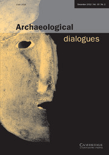
Archaeological Dialogues
Promoting Interdisciplinary Connections in ArchaeologyArchaeological Dialogues is a premier journal published by Cambridge University Press that serves as a vital forum for innovative discourse in the field of archaeology. Established in 1994, this journal has excelled in fostering scholarly communication and is recognized with a prestigious Q1 ranking in both Archaeology and Arts and Humanities, highlighting its significant impact in these domains. With an impressive impact factor, the journal commands a strong presence in the academic community, as reflected in its Scopus rankings, where it is positioned in the top 25% for archaeology and arts and humanities disciplines. Archaeological Dialogues seeks to explore diverse perspectives and methodologies in archaeology, offering researchers, professionals, and students invaluable insights into contemporary issues and debates. While not an open-access journal, it remains accessible through institutional subscriptions, ensuring that groundbreaking research reaches a broad audience engaged in the ever-evolving landscape of archaeological study. Located in the United Kingdom, this journal not only promotes interdisciplinary connections but also plays a pivotal role in shaping the future of archaeological research and discussion.
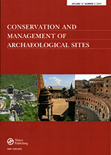
Conservation and Management of Archaeological Sites
Connecting Researchers and Practitioners for Lasting Impact.Conservation and Management of Archaeological Sites is a pivotal academic journal published by Routledge Journals, Taylor & Francis Ltd, focusing on the interdisciplinary fields of archaeology and conservation. With an ISSN of 1350-5033 and an E-ISSN of 1753-5522, this journal strives to publish high-quality research that addresses critical topics related to the conservation and management of archaeological sites, fostering dialogue between practitioners, researchers, and policymakers. Despite being categorized in the third quartile (Q3) across multiple relevant categories such as Archaeology and Conservation in the 2023 rankings, it remains a significant resource for professionals seeking to enhance their understanding and application of best practices in site management. The journal plays a crucial role in disseminating knowledge that contributes to the preservation of cultural heritage, making it an essential read for anyone involved in these vital fields. Published since 1995, the journal not only reflects the growing importance of archaeology in today's society but also provides a platform for emerging research that will shape future conservation strategies.